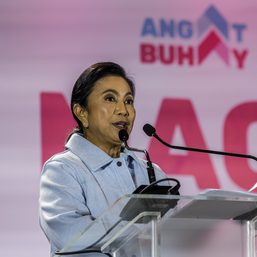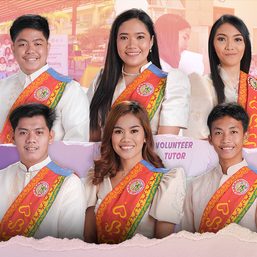SUMMARY
This is AI generated summarization, which may have errors. For context, always refer to the full article.

MANILA, Philippines — In the Philippines, the fundamental human right to education continues to elude indigenous people (IP). They face enormous challenges in their pursuit of this basic right.
They often endure long journeys, crossing mountains and rivers, to get to school. They also find themselves in the middle of armed conflicts, leaving them displaced and exposed to violence. As a result, there are children and even adults who are deprived of formal education.
This situation inspired Micah Simon, 24, a graduate of BA Philippine Studies from UP Diliman, to serve as a volunteer teacher in Lumad and Aeta communities, even before she passed the March 2023 Licensure Examination for Teachers (LET).
“Alam ko naman na hindi sukatan ang lisensya sa pagiging isang guro. Pero kahit papaano, masaya ang puso ko na nagbunga ang pagpupuyat at sakripisyo,” she said.
(I know that a teaching license is not the sole measure of being a teacher. But somehow, my heart is happy that the sleepless nights and sacrifices have borne fruit.)
The most recent LET saw 72,824 teachers who successfully passed the exam, out of 163,168 examinees nationwide.
A fulfilling experience
Simon’s strong sense of commitment and belief in the importance of volunteer work led her to actively seek opportunities to make a difference in the lives of others.
“I started in 2017 when I went to Mindanao and volunteered as a teacher for the Lumad for two months. I couldn’t envision myself without doing volunteer work because, for me, there was something missing. I found that fulfillment in teaching them,” she said.
During her college years, Micah actively participated in volunteer teaching at a Lumad Bakwit School, a school established for indigenous people who were displaced due to the escalating militarization in Mindanao. The students at the school represented various indigenous communities, including Mandaya, Manobo, B’laan, and Matigsalo.

Simon extended her teaching endeavors to volunteering at Liwanag at Dunong, a non-government organization (NGO) where she taught members of an Aeta community at the Aeata Learning Center in Sitio Gayaman, Tarlac every Sunday.
“Nagtuturo kami ng literacy and numeracy skills hindi lang sa mga bata kung hindi pati na rin sa mga matatanda,” (We teach literacy and numeracy skills, not only to children by to adults as well.) she said.
Recognizing the absence of formal education within the community, Simon is aware of the additional challenges faced by indigenous people in pursuing education. That is why she consistently emphasizes to her students the true significance and essence of education.
“I always remind them that learning or education is not a competition; you are not competing against each other. It is a collaborative endeavor, a collective effort,” she said in Filipino.
Simon said that teaching the indigenous communities brings a deep sense of fulfillment as it allows her to make a difference in the lives of individuals who have been deprived of their educational rights.

“At one point, the Lumad community was facing challenges including grave incidents and I would suggest skipping classes due to their exhaustion. Tapos sasabihin nila na, ma’am ayos lang po, magklase tayo, (Then they will tell me, it’s ok mam, let’s continue with our classes.)” Simon said in mix English and Filipino.
Red-tagging as a big challenge
However, Simon’s dedication as a volunteer teacher to IP communities did not exempt her from the relentless scrutiny and baseless accusations from authorities.
“Gusto mo lang naman magturo pero ire-redtag ka at ng kung ano-anong baseless accusations sa ‘yo. Ang sabi isumbong daw sa authority [kapag ganoon], pero sabi ko nga paano mo isusumbong sa authority kung sila mismo iyong nangha-harass sayo?” she said.
(I just want to teach, but they red tag you and throw all kinds of baseless accusations at you. They will tell us, we should report them to the authorities if these happen. But then I tell them how do we report them to authorities, when it is these authorities themselves who are harassing us.)
Despite fearing for her safety, Simon persisted in her role as a volunteer teacher, constantly reminding herself of the reason she is doing it.
“It is normal to feel afraid, but there is something bigger than our fears. Despite all of that, I still choose to go back to the community,” she said.
The volunteer teacher said that her students’ expression of gratitude serves as a constant reminder of the importance of her work and strengthens her resolve to continue her efforts in empowering and educating the community.
“Seeing all the smiles and hearing a simple thank you from the children and elders whom I teach is incredibly rewarding. It reinforces my passion for making a positive impact in their lives,” Simon said in Filipino.
Life lessons from teaching IPs
The volunteer teacher said her experience gave her a profound understanding of the harsh realities facing the country’s education system.
“There is an education crisis in the Philippines. Some say that education should not be political, but I believe it is inherently political,” Simon said.
A 2022 study by the World Bank, for example, found that learning poverty in the Philippines is among the highest in the East Asia and Pacific Region, with more than nine in 10 children unable to read basic text by age 10.
The same report underscores the country’s low spending on primary education, which was 83.5% lower than the average in the region. This is why for Micah, the government should invest in equitable access to education, especially among the underserved IP communities.
“In the first place dapat nga hindi nila ito pinagdarasal o pinaglalaban pa kasi karapatan naman nila iyon. Hindi naman sila naghahangad ng magarbo, gusto lang nila matutong bumasa, sumulat at magkwenta. Pero bakit natin pinagkakait sa kanila?” she said.
(In the first place, they shouldn’t even have to pray for or fight for this because it is their right. They are not asking for extravagant things; they simply want to learn how to read, write, and count. But why do we deny them that?)
Through her interactions with the IP community, Simon underscored she had developed a greater sense of compassion and a heightened commitment to fostering an inclusive and empowering learning environment for all students.
“I always carry with me the understanding that I may not be a perfect teacher, but I have the ability to be a good one. Understanding the needs of my students is essential,” she said.
Simon hopes that more educators will volunteer in IP communities.
“I hope rin na maraming mga susunod na Micah dyan na magiging volunteer teacher, kahit na minsan nakakapagod siya physically and of course wala siyang pera. (I hope there would be more Micahs out there who would become volunteer teachers, even though there are times she will get tired and, of course, will not have money),” she said.
Though she now has a regular day job, Simon said she wanted to share her knowledge and skills and continue volunteering in IP communities.
“Kahit saan ako dalhin, basta may bata at taong gustong matututo, magvo-volunteer ako,” Simon said.
(No matter where I go, as long as there are children and people who want to learn, I will volunteer.) — Rappler.com
Add a comment
How does this make you feel?


















![[Newspoint] A lesson begging to be learned](https://www.rappler.com/tachyon/2023/02/Constituency.jpg?resize=257%2C257&crop=202px%2C0px%2C720px%2C720px)
![[Newspoint] 19 million reasons](https://www.rappler.com/tachyon/2022/12/Newspoint-19-million-reasons-December-31-2022.jpg?resize=257%2C257&crop=181px%2C0px%2C900px%2C900px)
There are no comments yet. Add your comment to start the conversation.